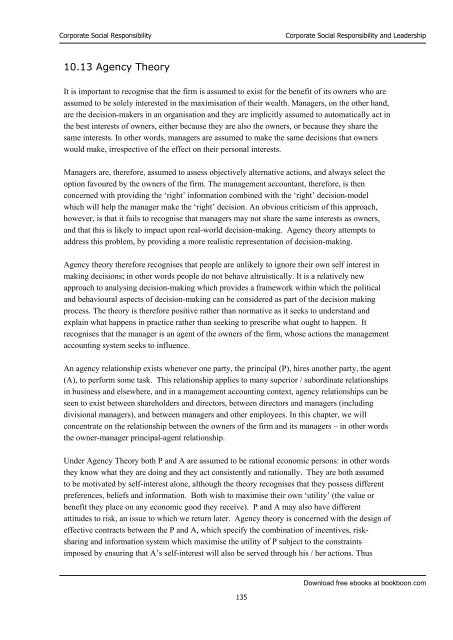Defining Corporate Social Responsibility - Tutorsindia
Defining Corporate Social Responsibility - Tutorsindia
Defining Corporate Social Responsibility - Tutorsindia
Create successful ePaper yourself
Turn your PDF publications into a flip-book with our unique Google optimized e-Paper software.
<strong>Corporate</strong> <strong>Social</strong> <strong>Responsibility</strong><br />
<strong>Corporate</strong> <strong>Social</strong> <strong>Responsibility</strong> and Leadership<br />
10.13 Agency Theory<br />
It is important to recognise that the firm is assumed to exist for the benefit of its owners who are<br />
assumed to be solely interested in the maximisation of their wealth. Managers, on the other hand,<br />
are the decision-makers in an organisation and they are implicitly assumed to automatically act in<br />
the best interests of owners, either because they are also the owners, or because they share the<br />
same interests. In other words, managers are assumed to make the same decisions that owners<br />
would make, irrespective of the effect on their personal interests.<br />
Managers are, therefore, assumed to assess objectively alternative actions, and always select the<br />
option favoured by the owners of the firm. The management accountant, therefore, is then<br />
concerned with providing the ‘right’ information combined with the ‘right’ decision-model<br />
which will help the manager make the ‘right’ decision. An obvious criticism of this approach,<br />
however, is that it fails to recognise that managers may not share the same interests as owners,<br />
and that this is likely to impact upon real-world decision-making. Agency theory attempts to<br />
address this problem, by providing a more realistic representation of decision-making.<br />
Agency theory therefore recognises that people are unlikely to ignore their own self interest in<br />
making decisions; in other words people do not behave altruistically. It is a relatively new<br />
approach to analysing decision-making which provides a framework within which the political<br />
and behavioural aspects of decision-making can be considered as part of the decision making<br />
process. The theory is therefore positive rather than normative as it seeks to understand and<br />
explain what happens in practice rather than seeking to prescribe what ought to happen. It<br />
recognises that the manager is an agent of the owners of the firm, whose actions the management<br />
accounting system seeks to influence.<br />
An agency relationship exists whenever one party, the principal (P), hires another party, the agent<br />
(A), to perform some task. This relationship applies to many superior / subordinate relationships<br />
in business and elsewhere, and in a management accounting context, agency relationships can be<br />
seen to exist between shareholders and directors, between directors and managers (including<br />
divisional managers), and between managers and other employees. In this chapter, we will<br />
concentrate on the relationship between the owners of the firm and its managers – in other words<br />
the owner-manager principal-agent relationship.<br />
Under Agency Theory both P and A are assumed to be rational economic persons: in other words<br />
they know what they are doing and they act consistently and rationally. They are both assumed<br />
to be motivated by self-interest alone, although the theory recognises that they possess different<br />
preferences, beliefs and information. Both wish to maximise their own ‘utility’ (the value or<br />
benefit they place on any economic good they receive). P and A may also have different<br />
attitudes to risk, an issue to which we return later. Agency theory is concerned with the design of<br />
effective contracts between the P and A, which specify the combination of incentives, risksharing<br />
and information system which maximise the utility of P subject to the constraints<br />
imposed by ensuring that A’s self-interest will also be served through his / her actions. Thus<br />
135<br />
Download free ebooks at bookboon.com
















